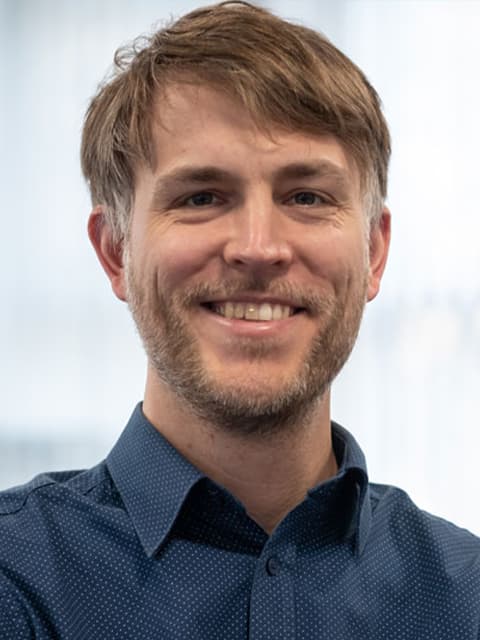Background:
Jon Wagner joined Loughborough in 2018 and was promoted to Senior Lecturer in 2022. He is the Programme Director for the Undergraduate Chemical Engineering Programme and Co-Director for the Interdisciplinary Centre for Circular Chemical Economy (CircularChem).
He completed his PhD in 2016 on the hydrothermal liquefaction of microalgae under supervision of Profs. Valeska Ting and Chris Chuck within the Centre for Sustainable Chemical Technologies at University Bath. Until his appointment at Loughborough, he joined the Horizon 2020 Photofuel project as research associate at Imperial College London, focusing on algae system scale-up and system analysis. Before his PhD, he worked in industry, completing the BP upstream process engineering graduate scheme, with placements in Aberdeen (Schiehallion FPSO) and the CATS terminal in Teesside.
Since 2012, Jon Wagner has secured more than £6m in research funding as PI or Co-I from UKRI and Royal Society. He currently leads a £483k IDRIC-Wave 2 funded project on ‘Algae-based carbon capture and utilisation for UK cluster decarbonisation’ with collaborators at Heriot Watt and University of Manchester, following a successful £125k proof of concept study on algae-based biomethane fuel purification. He is co-founder of Loughborough’s Mini-CDT in low-dimensional catalysis.
He is an editorial board member of Biomass & Bioenergy, and Guest Editor for RSC cross-journal themed collection on ‘Sustainable Composites’.
Qualifications:
- PhD in Chemical Engineering
- Centre for Sustainable Chemical Technologies, University of Bath
- MRes in Sustainable Chemical Technologies (Distinction)
- Centre for Sustainable Chemical Technologies, University of Bath
- MEng in Chemical Engineering (1st Class Hons)
- Department of Chemical Engineering, University of Bath
Key awards:
- 2022: Teaching Innovation Award: Multi-criteria decision making for 21st century chemical engineering design
- 2022: Winner of the Team Award with Sellafield Ltd at the 2022 IChemE Global Awards: Collaborating to Develop Nuclear Chemical Engineering Skills
- 2016: University Finalist for Ede & Ravenscroft Prize for best postgraduate research student
- 2016: University Finalist for Three Minute Thesis (RMT) competition
- 2014: Winner of Energy YES (Young Entrepreneur Scheme) business competition
Outline of main research interests
My research is focused on the development of circular, low-carbon processes to produce chemicals, fuels and other value-adding products from sustainably sourced biomass and end-of-life wastes. This is achieved by combining and integrating complementary biological, thermochemical and catalytic processes to maximise resource recovery and system efficiency.
Research interests include:
- Hydrothermal processing of biomass and municipal wastes
- Catalytic aqueous phase reforming
- Catalytic cracking
- Algae cultivation and scale-up
- Bio-oil upgrading
- System simulation and energy integration
- Biobased carbon capture and utilisation
Grants and contracts
- 2023 – 2024: PI, IDRIC Wave 2 Funding “Algae-based carbon capture and utilisation for UK cluster decarbonisation”
- 2020 – 2024: Co-I, Loughborough MiniCDT in low-dimensional catalysis
- 2021 – 2024: Co-I, EPSRC EP/V011863/1; “UKRI Interdisciplinary Centre for Circular Chemical Economy”
- 2022: PI, Institute of Advanced Studies, Fellowship for Prof Jorge Beltramini
- 2019 – 2021: Co-I, EPSRC (through Supergen Bioenergy Hub) “Algae-based biomethane fuel purification and carbon sequestration: an integrated approach”
- 2019 – 2020: PI, Royal Society RGS\R1\191135, “Integrated conversion of municipal waste residues into liquid and gaseous fuels”
Teaching responsibilities:
- CGB001: Process Design and Safety (Module Lead)
- CGB014: Instrumentation and Control
- CGB020: Process Systems Engineering
- CGC032: Circular Economy
- CGC001/CGC038: Individual/Team Process Design Project
- CGP083: Process Intensification and Integration
Administrative responsibilities:
- Programme Director for Chemical Engineering Undergraduate Programme
Recent publications:
- Mukundan S, Xuan J, Dann S, Wagner JL (2023). Highly active and magnetically recoverable heterogeneous catalyst for hydrothermal liquefaction of biomass into high quality bio-oil. Bioresource Technology, 369: 128479. DOI: 10.1016/j.biortech.2022.128479
- Roy U, Wagner JL, Radu T (2023). Production of Metabolites in Microalgae Under Alkali Halophilic Growth Medium Using a Dissolved Inorganic Carbon Source. Waste and Biomass Valorization.
- Roy U, Radu T, Wagner JL (2022). Hydrothermal carbonisation of anaerobic digestate for hydro-char production and nutrient recovery. Journal of Environmental Chemical Engineering. 10 (1): 107027. DOI: 10.1016/j.jece.2021.107027
- Okoligwe O, Radu T, Leaper M, Wagner JL (2022). Characterization of municipal solid waste residues for hydrothermal liquefaction into liquid transportation fuels. Waste Management, 140: 133-142. DOI: 10.1016/j.wasman.2022.01.026
Selected publications:
- Roy UK, Radu T, Wagner JL (2021). Carbon-negative biomethane fuel production: Integrating anaerobic digestion with algae-assisted biogas purification and hydrothermal carbonisation of digestate. Biomass and Bioenergy, 148: 106029, DOI: 10.1016/j.biombioe.2021.106029.
- Wagner, J.L., Lee-Lane, D., Monaghan, M., Sharifzadeh, M., Hellgardt, K. (2019) Recovery of excreted n-butanol from genetically engineered cyanobacteria cultures: Process modelling to quantify energy and economic costs of different separation technologies. Algal Research, 37. https://doi.org/10.1016/j.algal.2018.11.008
- Wagner, J.L., Le, C.D., Ting, V.P., Chuck, C.J. (2017) Design and operation of an inexpensive, laboratory-scale, continuous hydrothermal liquefaction reactor for the conversion of microalgae produced during wastewater treatment. Fuel Processing Technology, 165. https://doi.org/10.1016/j.fuproc.2017.05.006
- Wagner, J., Bransgrove, R., Beacham, T.A., Allen, M.J., Meixner, K., Drosg, B., Ting, V.P., Chuck, C.J. (2016) Co-production of bio-oil and propylene through the hydrothermal liquefaction of polyhydroxybutyrate producing cyanobacteria. Bioresource Technology, 207. https://doi.org/10.1016/j.biortech.2016.01.114
